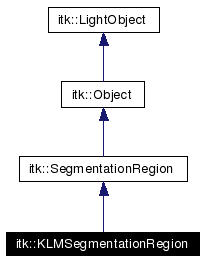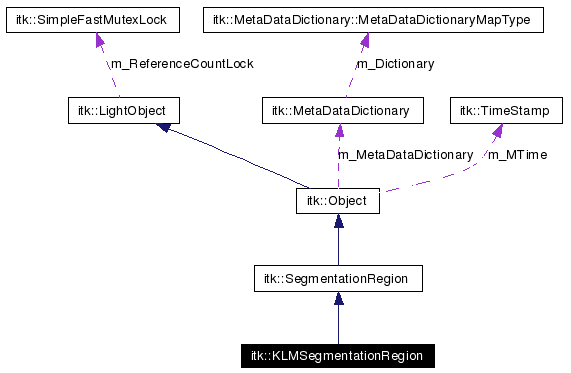
#include <itkKLMSegmentationRegion.h>
Inheritance diagram for itk::KLMSegmentationRegion:


itkKLMSegmentationRegion is the base class for the KLMSegmentationRegion objects. It provides the basic function definitions that are inherent to KLMSegmentationRegion objects.
This object supports data handling of multiband images. The object accepts images in vector format, where each pixel is a vector and each element of the vector corresponds to an entry from 1 particular band of a multiband dataset.
We expect the user to provide the input to the routine in vector format. A single band image is treated as a vector image with a single element for every vector.
Data structure for a region: A region is defined as a closed area in the image that is surrounded by a list of borders objects (see itkKLMSegmentationBorder class).
Shown below is an initial two-dimensional 8x9 image with a 4x3 grid size partition. The initial region blocks are labelled in hexadecimal. Below the grid partition, the borders are shown as E, where C is an image pixel from the initial image. Note that each border is placed in between two regions. Each two-dimensional region is surrounded by four borders.
Initial regions of a 8 by 9 image with a 4 by 3 grid partition.
![\[\begin{tabular}{|c|c|c|c|c|c|c|c|c|} \hline 1 & 1 & 1 & 2 & 2 & 2 & 3 & 3 & 3 \\ \hline 1 & 1 & 1 & 2 & 2 & 2 & 3 & 3 & 3 \\ \hline 4 & 4 & 4 & 5 & 5 & 5 & 6 & 6 & 6 \\ \hline 4 & 4 & 4 & 5 & 5 & 5 & 6 & 6 & 6 \\ \hline 7 & 7 & 7 & 8 & 8 & 8 & 9 & 9 & 9 \\ \hline 7 & 7 & 7 & 8 & 8 & 8 & 9 & 9 & 9 \\ \hline a & a & a & b & b & b & c & c & c \\ \hline a & a & a & b & b & b & c & c & c \\ \hline \end{tabular}\]](form_147.png)
Region borders are shown as ``E''.
![\[\begin{tabular}{|c|c|c|c|c|c|c|c|c|c|} \hline C & C & C & & C & C & C & & C & C & C \\ \hline C & C & C & E & C & C & C & E & C & C & C \\ \hline & E & & & & E & & & & E & \\ \hline C & C & C & & C & C & C & & C & C & C \\ \hline C & C & C & E & C & C & C & E & C & C & C \\ \hline & E & & & & E & & & & E & \\ \hline C & C & C & & C & C & C & & C & C & C \\ \hline C & C & C & E & C & C & C & E & C & C & C \\ \hline & E & & & & E & & & & E & \\ \hline C & C & C & & C & C & C & & C & C & C \\ \hline C & C & C & E & C & C & C & E & C & C & C \\ \hline \end{tabular}\]](form_148.png)
Definition at line 89 of file itkKLMSegmentationRegion.h.
|
|
Reimplemented from itk::SegmentationRegion. Definition at line 100 of file itkKLMSegmentationRegion.h. |
|
|
Reimplemented from itk::SegmentationRegion. Definition at line 99 of file itkKLMSegmentationRegion.h. |
|
|
Type definition for the const region border vector iterators to be used. Definition at line 116 of file itkKLMSegmentationRegion.h. |
|
|
Type definition for the region border vector iterators to be used. Definition at line 113 of file itkKLMSegmentationRegion.h. |
|
|
Type definition for vector container that stores the borders associated with a current region. Definition at line 110 of file itkKLMSegmentationRegion.h. |
|
|
type definition for the region label type. Reimplemented from itk::SegmentationRegion. Definition at line 119 of file itkKLMSegmentationRegion.h. |
|
|
Standard class typedefs. Reimplemented from itk::SegmentationRegion. Definition at line 97 of file itkKLMSegmentationRegion.h. |
|
|
Reimplemented from itk::SegmentationRegion. Definition at line 98 of file itkKLMSegmentationRegion.h. |
|
|
|
|
|
|
|
|
Set the region with parameter values (mean and area) defining the region when merged with the new region. |
|
|
Delete all region borders in the border list. |
|
|
Delete a region border from the border list. |
|
|
Compute the energy cost (mean squared difference scaled by area) that would result if this region is merged with another region. |
|
|
|
|
|
Run-time type information (and related methods). Reimplemented from itk::SegmentationRegion. |
|
|
Get a head pointer to the vector container storing the borders associated with a region. |
|
|
Get a tail pointer to the vector container storing the borders associated with a region. |
|
|
Get a head pointer to the vector container storing the borders associated with a region. |
|
|
Get a tail pointer to the vector container storing the borders associated with a region. |
|
|
Get the number of borders in the vector container storing the borders associated with a region. |
|
||||||||||||
|
Insert a region border into the border list at a given location. |
|
|
Insert a region border to the list, where position is unknown (sorting based on region labels is done to maintain consistency). |
|
|
Method for creation through the object factory. Reimplemented from itk::SegmentationRegion. |
|
|
Function to print the region parameters using std::cout. |
|
||||||||||||
|
Methods invoked by Print() to print information about the object including superclasses. Typically not called by the user (use Print() instead) but used in the hierarchical print process to combine the output of several classes. Reimplemented from itk::SegmentationRegion. |
|
|
Insert a region border to the back of the list. |
|
|
Insert a region border to the front of the list. |
|
|
Reset a region's label to that of the supplied region and update the regions borders to that of the supplied region. |
|
|
Set/Get the mean pixel intensity in the region. |
|
||||||||||||||||
|
Set the region with parameter values defining the region. |
|
|
Splice the regions borders from the new region into the current region. If duplicate borders are found, the duplicate border region is not inserted into the new region borders list, rather, it has its pointers to region1 and region2 set to NULL and Lambda set to -1.0. For example, take an image with 3 regions A, B, C
where region A has region borders A-B and A-C; region B has region borders A-B and B-C; and region C has region borders A-C and B-C. Suppose region border A-B has been removed, so that region B can be merged into region A. When splicing the region borders from A and B into the new region A, duplicate region borders A-C and A-C (one of which was formerly B-C) will be present. In this case, one of the region borders A-C is given the combined length of the two former borders and is put into the region borders list. The other is nullified by having its pointers to region1 and region2 set to NULL and its Lambda value set to -1.0. |
|
|
Recalculate the Lambda values using EvaluateLambda() for all the borders defining the region. |
 1.3.5 written by Dimitri van Heesch,
© 1997-2000
1.3.5 written by Dimitri van Heesch,
© 1997-2000